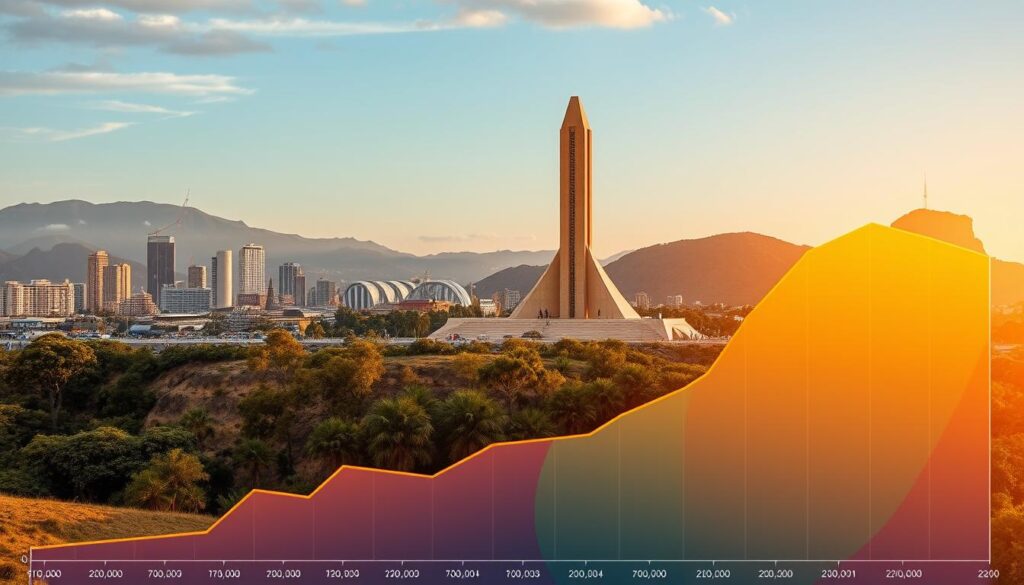The government budget of South Africa plays a key role in shaping the country’s economic future. It lays out a financial plan for using money across different areas to improve public well-being, grow infrastructure, and provide social services. South Africa plans to use R2.04 trillion (US$109.7 billion) and spend R2.4 trillion (US$128.4 billion) in the 2024/25 fiscal year.
This creates a budget deficit of 16.4% of GDP, showing the financial challenges the nation faces. The budget’s approach affects economic growth and directly influences the lives of its citizens. Hence, knowing what the budget entails and its effects is crucial.
Anúncios
Introduction to South Africa’s Government Budget
The South Africa budget is a key plan for handling the nation’s money. It details how the government plans its spending, important for knowing where money goes, like in schools and hospitals. By looking at the whole economy, the budget helps in deciding how much money will be made and spent.
Creating the budget every year means looking at a lot of details. This process helps the government make plans to solve big problems in society. It connects what the government wants to do with what actually happens. This makes sure the government does its job. The effects of the budget are seen everywhere in public work, affecting both now and the future.

What is a Government Budget?
A government budget is a formal document. It outlines expected money coming in and planned spending for a set time. It’s crucial for managing a government’s finances, serving as a guide for its financial actions.
This budget is made up of different parts, like sources of income and spending on public services. It lines up with national plans and laws, focusing on the well-being of the public, big development projects, and economic health.
Deciding how to divide the budget is key to using limited money wisely. Governments aim to support essential services and projects. This helps grow the economy and meet the people’s needs. Knowing about the government budget helps understand the bigger economic picture.
Importance of the Government Budget
The government budget is key to a country’s direction and wellbeing. It shows what the nation thinks is important and puts money into things like schools, healthcare, and roads. This helps everyone and makes sure important areas get the support they need.
Reflection of National Priorities
What a country spends its money on shows what it cares about. Spending a lot on education and healthcare means it wants to improve life for its people. This helps create a smarter, healthier community.
Impact on Economic Growth
The budget has a big effect on the economy. By investing in the right areas, like building projects, it can boost activity and growth. This not only creates jobs but also sparks new ideas in different fields. A good budget helps the country grow in a stable way, helping everyone.
Components of the Government Budget
The South African government’s budget is made up of revenues and expenditures. Knowing about these parts helps us understand how the country handles its finances and distributes public money.
Revenues: Sources of Funds
Revenue sources are crucial for the government’s funding. South Africa gets its budget money mainly from:
- Personal Income Tax: R587.9 billion
- Corporate Taxes: R269.9 billion
- Value-Added Tax (VAT): R439.7 billion
This money is vital for running government operations and backing various public schemes.
Expenditures: Allocation of Resources
How funds are allocated shows the government’s dedication to crucial services and infrastructure. The major areas where funds go include:
- Education: R480.6 billion
- Health: R271.9 billion
- Social Development: R387.3 billion
This careful distribution helps better public services and meets the needs of the South African people efficiently.
Budget Cycle and Preparation Process
Creating the budget in South Africa takes about 14 months. This time allows for careful planning and talking to different people involved in the process. The fiscal year starts on April 1 and ends on March 31, following a set timeline. This schedule matches government money matters with the country’s economic activities.
Fiscal Year and Budget Timeline
The fiscal year is key to planning the budget. Each part of the budget timeline is planned out carefully. This makes sure things are done well and keeps everyone accountable. It makes a clear plan for handling the country’s finances.
Stakeholders Involved in Preparation
Many different groups are important in making the budget. Key players include:
- Minister of Finance
- National Treasury
- Parliamentary committees
- Government departments
- Civil society organizations
They work together to make the budget process clear and gain the public’s trust. Their ideas help make a budget that shows what the country needs and wants.
South Africa’s Revenue Generation
Understanding how South Africa gets its money is key to knowing its economy. The country uses different taxes to pay for government projects and shape the economy. Personal income tax is a big part of this, showing a clear focus in their money plans.
Personal Income Tax Breakdown
South Africa relies a lot on personal income tax. This tax has played a big role in the country’s income for years. It’s been growing recently. People with higher incomes pay more, which helps fund public services and supports fairness. In 2023, personal income tax made up a big chunk of all the money the country got.
Corporate Income Tax and VAT Contributions
Business taxes and VAT are key parts of South Africa’s income plan. Business taxes help companies be fair and follow rules. VAT brought in R439.7 billion, showing how taxes from businesses and people help the economy. These taxes touch all parts of life and business, keeping the economy moving.
Overview of Expenditures in the Budget
The government budget shows how money is given to different areas that affect us all, like schools and hospitals. A big part of the budget goes to education and health. This shows how important they are for growth and for getting necessary services.
Key Spending Areas: Education and Health
In South Africa, a lot of money is put into education to help the nation grow. The government has set aside R480.6 billion for schools. This money is for better learning and buildings. Health is also key, with R271.9 billion spent to make sure everyone can get good medical care.
Defence and Social Development Costs
But it’s not just schools and hospitals that need money. Defence and social development are important too. Money for defence keeps the country safe and stable. Funds for social development help those in need across South Africa. This shows the government cares about safety and helping everyone.
Understanding the Budget Deficit
South Africa is dealing with a tricky situation in its finances. A budget deficit has hit 16.4%, which is worrying. It means the government is spending more than it makes. To fix this, leaders need to be smart with money and reduce spending.
Handling this financial gap wisely is very important. It’s about making good choices on where to spend money and keeping an eye on costs. This way, the country can stay stable and grow in a healthy way. Leaders must focus on being careful with money to ensure a bright future.
Recent Trends in the National Budget
The latest budget trends in South Africa show a dynamic way of managing money. The 2024/25 budget focuses on growing the economy and putting money into important areas. It tries to find new ways to make money and support major policy goals.
2024/25 Budget Review Highlights
This review presents major changes for improving the country’s financial health. It points out critical areas such as:
- Increased funding for infrastructure development.
- Targeted investments in social programs to uplift communities.
- Efforts to improve efficiency in public spending.
Economic Policies Impacting the Budget
Economic policies play a big role in shaping the budget. Strategies focus on overcoming challenges and supporting recovery. Important areas include:
- Implementing measures to stimulate economic activity.
- Adjusting tax policies to bolster government revenues.
- Balancing social spending with necessary cuts in others areas to sustain fiscal discipline.
Future Outlook for South Africa’s Government Budget
South Africa’s government budget forecast is influenced by financial challenges and new chances. The country is dealing with complex economic issues. It is focusing on strong governance and making good use of resources. Reducing the growing budget deficit is key. This needs smart fiscal plans that focus on long-term success. Bringing in reforms could make things more transparent and improve public trust. This would help create a better financial situation.
Challenges and Opportunities
In the next few years, South Africa will face major financial hurdles. These could affect the country’s economic health. The main problems are:
- Handling rising public debt.
- Making sure money is spent well in different areas.
- Keeping the cost of essential services in check.
Even with these issues, there is a chance for improvement. Taking steps to better tax collection and spending wisely could strengthen the budget.
Fiscal Policies and Reform Measures
Good fiscal policies are crucial for the budget’s future. Expected changes include:
- Improving money coming in with tax reforms. These aim to get more people paying taxes.
- Putting in place ways to cut down on unnecessary spending.
- Encouraging partnerships between government and private companies. This will help fund important projects.
To make sure we’re on the right path, we’ll need to keep a close eye on these actions. Doing so will help build trust in the budget process. This is important for a stable financial future.
Conclusion
The South African government budget shows how the state plans to spend money for its people. It is a key document that details fund allocation for different areas. This affects economic growth and the well-being of citizens.
Understanding this budget helps citizens know their part in democracy. Being informed means they can participate more actively.
Being responsible with public money is a must. It ensures that funds are used well and openly. As the economy changes, adapting the budget is crucial to meet everyone’s needs.
Staying aware of how the budget is carried out is important. It helps build a stronger economy that benefits all South Africans.
FAQ
What is the purpose of South Africa’s government budget?
How is the budget deficit affecting South Africa’s economy?
What are the main sources of revenue for South Africa’s government?
Who are the key stakeholders involved in the budget preparation process?
What are the major areas of expenditure within the budget?
How often is the government budget reviewed and updated?
Why is effective fiscal management important for economic growth?
What opportunities exist for fiscal reform in South Africa?
Conteúdo criado com auxílio de Inteligência Artificial



